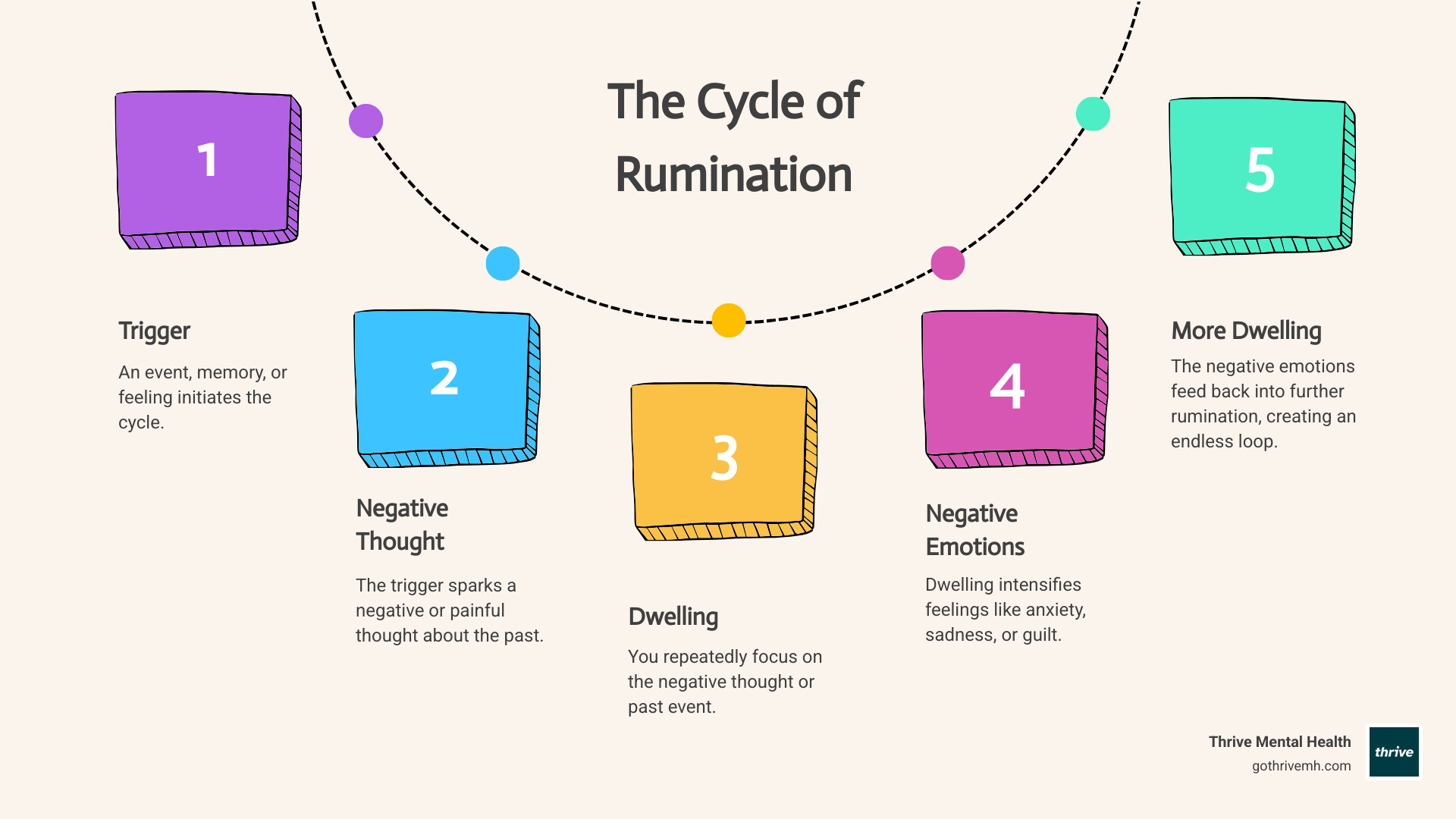How to Stop Thinking About the Past: 5 Methods That Guarantee Results

Why Your Brain Won’t Stop Replaying Yesterday (And What You Can Do About It)
Initial Crisis Disclaimer: If you are in a crisis or experiencing suicidal thoughts, please call or text the 988 Suicide & Crisis Lifeline at 988. You are not alone, and help is available now.
How to Stop Thinking About the Past: 5 Methods That Guarantee Results
How Do You Stop Thinking About the Past? You can stop dwelling on the past by practicing mindfulness to interrupt rumination, cultivating self-compassion and acceptance, journaling and setting new goals to shift your focus forward, using pattern interruption techniques, and seeking professional therapy when needed. These methods work by breaking the repetitive thought cycle and processing unresolved emotions.
Quick Answer: 5 Methods That Work
- Practice mindfulness – Observe thoughts without judgment, use grounding exercises
- Cultivate self-compassion – Accept feelings, treat yourself with kindness
- Re-engage your brain – Journal emotions, set SMART goals for the future
- Interrupt the pattern – Move your body, change environments, schedule “worry time”
- Talk about it – Share with trusted people or a professional therapist
You know the feeling.
It’s 2 AM and your brain is still replaying that conversation from three years ago. Or that mistake you made at work. Or that relationship that ended badly. You tell yourself to move on, but your mind keeps circling back like a song stuck on repeat.
This isn’t just annoying—it’s exhausting. And you’re not alone.
Dwelling on the past is one of the most common patterns I see in my practice. It’s called rumination, and it’s different from healthy reflection. Reflection helps you learn and grow. Rumination keeps you trapped in a mental loop that fuels anxiety and depression.
The good news? You can break free.
Research shows that rumination is a learned behavior, which means it can be unlearned. With the right strategies—from simple grounding exercises to evidence-based therapy—you can quiet that mental replay button and reclaim your present.
This article walks you through five practical methods that actually work. Not vague advice like “just let it go,” but specific, research-backed techniques you can start using today.
As Anna Green, LMHC, LPC, and Chief Clinical Officer at Thrive Mental Health, I’ve spent years helping people understand How Do You Stop Thinking About the Past through evidence-based therapies like EMDR, CBT, and psychodynamic approaches. The strategies I’m sharing here are the same ones we use in our virtual IOP and PHP programs in Florida—tools that help people move from stuck to unstuck, from rumination to resilience.

How Do You Stop Thinking About the Past? terms to remember:
Understanding Rumination: Why You’re Stuck in a Mental Loop
To stop thinking about the past, you first need to understand rumination: the repetitive and often painful pattern of replaying past events. Your brain isn’t trying to hurt you; it’s attempting to problem-solve or protect you from future pain. However, this process often gets stuck in an unproductive loop.
Rumination can stem from several sources:
- Unprocessed trauma: The brain struggles to make sense of overwhelming events, replaying them to find a resolution that never comes.
- Personality traits: Perfectionism or a tendency to avoid difficult emotions can make you more prone to replaying scenarios.
- A misguided attempt to learn: Your mind might believe that by dwelling on a mistake, it can prevent it from happening again.
The impact of rumination is significant. Research on rumination and depression shows it actively fuels both depression and anxiety. It can disrupt sleep, drain motivation, and even contribute to physical inflammation.
Healthy Reflection vs. Unhealthy Rumination
It’s crucial to distinguish between helpful reflection and harmful rumination. Healthy reflection is goal-oriented and leads to learning or acceptance. Unhealthy rumination is repetitive, focuses on blame and negativity, and leaves you feeling worse.
| Feature | Healthy Reflection | Unhealthy Rumination |
|---|---|---|
| Focus | Learning, problem-solving, understanding | Repetitive negative thoughts, what went wrong |
| Outcome | Insight, personal growth, acceptance | Increased distress, anxiety, feeling stuck |
| Emotional Tone | Curious, analytical, purposeful | Self-blame, regret, hopelessness |
| Action Orientation | Leads to constructive action or acceptance | Paralysis, no resolution |
| Duration | Time-limited, purposeful | Prolonged, intrusive, hard to control |
Recognizing when your thoughts shift from productive reflection to a stuck, distressing loop is the first step toward breaking free.
5 Practical Methods to Stop Thinking About the Past
Breaking free from the past isn’t about erasing memories, but changing your relationship with them. These five evidence-based strategies can help you shift from feeling like a hostage to your thoughts to an observer who is in control.

Method 1: Practice Mindfulness & Grounding
Mindfulness is the practice of being present. It teaches you to observe ruminating thoughts without getting entangled in them. Instead of being swept away by a memory, you can notice it (“There’s that thought again”) and gently return your focus to the present. Mindfulness training is proven to reduce rumination.
- Deep Breathing: When you start to spiral, pause and take a slow, deep breath. Focus on the physical sensation. Your breath is always in the now, making it a perfect anchor.
- The 5-4-3-2-1 Method: Quickly pull your brain into the present by naming: 5 things you can see, 4 things you can feel, 3 things you can hear, 2 things you can smell, and 1 thing you can taste.
- Mindful Observation: Pick an object and observe it for one minute. Notice its color, texture, and shape without judgment. This trains your brain to focus on the present.
Method 2: Cultivate Self-Compassion & Acceptance
Rumination is often fueled by a harsh inner critic. Acceptance doesn’t mean condoning what happened; it means acknowledging reality without fighting it. This concept, known as radical acceptance in Dialectical Behavior Therapy (DBT), stops you from creating extra suffering over an unchangeable past.
Self-compassion is the next step. Instead of berating yourself for a mistake, treat yourself with the same kindness you’d offer a friend. Acknowledge that making mistakes is part of being human. This releases the burden of self-blame that keeps you chained to the past. Forgiving yourself and others isn’t about excusing behavior—it’s about freeing yourself from resentment.
Method 3: Re-engage Your Brain with Journaling & New Goals
Give your brain something better to do than dwell on the past.
- Journaling: Writing down your thoughts externalizes them, helping you process emotions and gain perspective. It turns a mental loop into a linear narrative, which can provide a sense of closure.
- Setting SMART Goals: Shift your focus from “what was” to “what could be.” Set goals that are Specific, Measurable, Achievable, Relevant, and Time-bound. This creates forward momentum.
- Exploring New Hobbies: Learning something new, like a language or a sport, builds new neural pathways. It creates fresh memories and reminds you that life is still happening now.
Method 4: Interrupt the Thought Pattern
When you catch yourself ruminating, use a pattern interruption technique to snap out of it.
- Physical Movement: Stand up and move. A brisk walk, stretching, or dancing can quickly change your mental state by releasing endorphins.
- Change Your Environment: If you’re ruminating in one room, move to another. Stepping outside for a moment can provide a powerful mental reset.
- Schedule “Worry Time”: Designate 15-20 minutes each day to consciously think about past issues. If a thought appears outside this time, tell yourself you’ll address it later. This contains the thoughts and makes them less intrusive.
- Thought-Stopping Phrases: Use a simple phrase like “Cancel” or “Not now” when an unwanted thought arises. This creates a deliberate pause, giving you a chance to redirect your attention.
Method 5: Process the Past by Talking About It
Sometimes, the past is too heavy to carry alone.
- Talk to Trusted People: Articulating your experiences to friends or family helps you organize your thoughts and gain validation. Hearing an outside perspective can break the narrow, distorted view created by rumination.
- Seek Professional Support: For deep-seated pain or trauma, a therapist provides a safe space for processing. They are trained to guide you through healing in ways friends and family cannot. This is especially important when overcoming childhood trauma.
When Professional Help Is Necessary

Self-help strategies are powerful, but sometimes they aren’t enough. It’s not a sign of failure—it’s a sign that you may need more structured support to heal. Consider reaching out to a professional if you experience:
- Persistent, uncontrollable thoughts: The thoughts feel impossible to escape, no matter what you try.
- Impaired daily functioning: Rumination interferes with your job, relationships, sleep, or self-care.
- Intense emotional distress: You feel overwhelming and persistent sadness, guilt, shame, or hopelessness.
- Intrusive memories or flashbacks: You feel like you are reliving a traumatic event, which may be a symptom of PTSD.
Dwelling on the past can also be a symptom of underlying conditions like depression, anxiety, or OCD. A mental health professional can provide a custom approach to address your specific needs.
At Thrive Mental Health, we make getting help straightforward for residents of Florida. We offer virtual and in-person intensive outpatient (IOP) and partial hospitalization (PHP) programs with flexible evening options. Our services are available to anyone in Florida, with in-person care offered at our Tampa Bay and Miami locations. We work with major insurance providers, including Cigna, Optum, and Florida Blue, to make treatment accessible. You can verify your insurance coverage in minutes with no obligation.
How Therapy Helps You Stop Thinking About the Past
When you’re stuck, therapy offers a structured path to healing. It’s not about being told to “let go,” but about using evidence-based techniques to help your brain process what happened. At Thrive Mental Health, our Online Counseling for Trauma programs provide expert support to residents throughout Florida, allowing you to heal from wherever you are.
Cognitive Behavioral Therapy (CBT)
CBT is highly effective for breaking negative thought cycles. It operates on the principle that our thoughts, feelings, and behaviors are connected. In therapy, you learn to:
- Identify cognitive distortions: Recognize unhelpful thought patterns like catastrophizing or overgeneralizing.
- Challenge and reframe thoughts: Question the validity of negative thoughts and develop more balanced perspectives.
- Build practical coping skills: Gain tools to interrupt rumination in your daily life.
Eye Movement Desensitization and Reprocessing (EMDR)
EMDR is a powerful therapy for processing “stuck” traumatic memories. These memories can remain raw and intrusive years after an event. EMDR uses bilateral stimulation (like eye movements) to help your brain reprocess these memories, moving them from “active threat” to “past event.” The memory doesn’t disappear, but it loses its emotional power, allowing you to recall it without being re-traumatized. Learn more in our EMDR Complete Guide.
Other Effective Therapies

Different people benefit from different approaches. We also offer:
- Psychodynamic Therapy: Explores unconscious patterns, often from childhood, to understand the root cause of why you’re stuck.
- Dialectical Behavior Therapy (DBT): Teaches skills in mindfulness, emotional regulation, and distress tolerance. Its focus on radical acceptance is especially helpful for letting go of a painful past.
- Group Therapy: Our IOP and PHP programs offer the chance to connect with others who have similar struggles. This shared experience reduces isolation and provides new perspectives.
Explore a comparison of these methods in our guide to CBT vs DBT vs EMDR. The right professional support is a courageous choice that can help you move forward.
Frequently Asked Questions about Letting Go of the Past
I hear these questions all the time in therapy sessions, and they’re worth addressing directly. Let’s talk through some of the most common concerns people have when they’re trying to understand How Do You Stop Thinking About the Past.
What is the difference between reflecting on the past and ruminating?
This is such an important distinction, and it’s one that many people struggle to recognize in themselves. Reflection is your friend—it’s an active, purposeful process where you look back on an experience with the intention of learning something useful. You might ask yourself, “What can I take from this?” or “How do I want to handle things differently next time?” Reflection has a beginning, middle, and end. It leads somewhere productive, usually toward acceptance or a concrete action plan.
Rumination, on the other hand, is the mental equivalent of spinning your wheels in mud. It’s passive, repetitive, and circular. You’re dwelling on the same negative thoughts and feelings over and over—”Why did I do that?” “How could I have been so stupid?” “What if things had been different?”—without ever arriving at a solution or feeling any better. In fact, rumination typically increases your distress, feeding anxiety and depression rather than relieving them.
The key difference? Reflection moves you forward. Rumination keeps you stuck.
Can you ever completely forget a traumatic past?
I’m going to be honest with you here: the goal of healing isn’t amnesia. And honestly, that’s a good thing. Our experiences—even the painful ones—shape who we are and how we understand the world.
What therapy can do is reduce the emotional power that traumatic memories hold over your present life. Through processing techniques like EMDR, CBT, or psychodynamic therapy, we help those memories become integrated into your life story. They transform from raw, unprocessed wounds that hijack your nervous system into events that happened to you—events you survived—but that no longer control how you feel today.
Think of it this way: the memory doesn’t disappear, but it stops showing up uninvited, demanding all your attention, and flooding you with the same intense emotions you felt when it first happened. Memories become part of your narrative rather than the narrator itself.
How long does it take to stop dwelling on the past?
I wish I could give you a neat, tidy answer—something like “six weeks” or “three months.” But the truth is, there’s no universal timeline for healing. Progress depends on several factors: the nature and severity of the past experiences you’re working through, whether they involve trauma, how long you’ve been ruminating, your support system, and which methods or therapies you’re using.
Some people notice significant relief within a few weeks of consistently practicing mindfulness and grounding techniques. Others, particularly those working through complex trauma or long-standing patterns, may need several months of therapy to see meaningful change.
What I can tell you is this: consistent practice of coping skills combined with professional support when needed significantly speeds up the healing process. You don’t have to do this alone, and you don’t have to do it perfectly. Every small step—every time you catch yourself ruminating and redirect your attention, every therapy session where you process a difficult memory, every moment you choose self-compassion over self-criticism—is progress.
The journey isn’t always linear, but movement forward is possible.
Take the First Step Toward Your Future
Breaking free from the past is a challenge, but it is possible. By using strategies like mindfulness, self-compassion, and pattern interruption, and seeking professional support when needed, you can reclaim your present. The goal isn’t to erase your history, but to integrate it in a way that empowers you.
At Thrive Mental Health, we provide expert-led, evidence-based care to help Floridians move forward. Our virtual and in-person IOP and PHP programs in Florida are designed to help you heal from trauma, anxiety, and depression.
Begin your healing journey from trauma.

Ready for support in Florida? Thrive offers virtual and hybrid IOP/PHP with evening options. Verify your insurance in 2 minutes (no obligation) → Start benefits check or call 561-203-6085. If you’re in crisis, call/text 988.
{
"@context": "https://schema.org",
"@type": "FAQPage",
"mainEntity": [{
"@type": "Question",
"name": "What is the difference between reflecting on the past and ruminating?",
"acceptedAnswer": {
"@type": "Answer",
"text": "Reflection is an active, constructive process aimed at learning and problem-solving, which leads to closure. Rumination is a passive, repetitive cycle of dwelling on negative thoughts and feelings without moving toward a solution, which increases distress."
}
},{
"@type": "Question",
"name": "Can you ever completely forget a traumatic past?",
"acceptedAnswer": {
"@type": "Answer",
"text": "The goal of therapy isn't to forget the past, but to reduce its emotional power so it no longer controls your present. Through processing, memories become part of your story rather than a source of constant pain."
}
},{
"@type": "Question",
"name": "How long does it take to stop dwelling on the past?",
"acceptedAnswer": {
"@type": "Answer",
"text": "There is no set timeline. Progress depends on the individual, the nature of the past experiences, and the methods used. Consistent practice of coping skills and professional support can significantly speed up the healing process."
}
}]
}